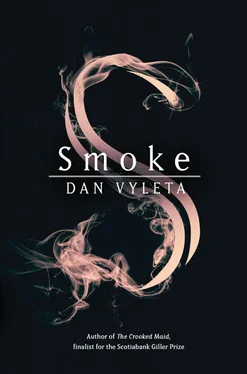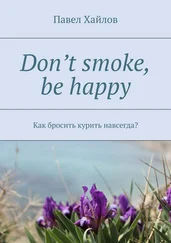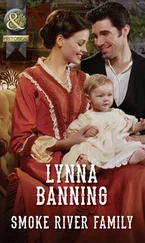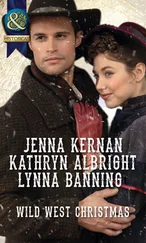“I wonder what platform it is, to London.”
Thomas looks at him caustically. Don’t pity me , his look is saying. Don’t you dare pity me.
“We are with the swine.”
It takes Charlie a moment to understand the remark. Then he sees them, a mass of goats, sheep, and pigs, standing in the filth of their excretions. They are at the far end of the station, on a platform separated from the others by a barrier and a gatehouse, and are being herded onto a series of freight cars. Once the doors are shut on them, snouts appear at the breathing holes, pale, almost colourless nostrils sucking on air. Even from the distance, Charlie can sense their fear.
“But that’s a freight train.”
“Most of it is. Food for London. But look.”
Thomas’s finger points at two passenger cars near the front of the train, recognisable by their rows of windows. Workers mill about on the platform, their chequered caps and waistcoats stained by old Soot. It is a shock to find children amongst them, some as young as nine. Puffs of Smoke trail them. One, a girl of twelve, thirteen years, is dressed only in vest and trousers, despite the cold. Her vest is so drenched in Soot, it hangs heavy off her narrow shoulders. She notices the schoolboys lining up near the barriers and flashes them a harelipped grimace, followed by a shout that’s lost in the distance.
“What did she say?” he asks Thomas.
Thomas looks at him, starts to speak, blushes. It is a startling moment, a first. Nothing else has ever made Thomas blush.
“Better if you did not hear.”
“A curse word?”
“Yes. Anatomical. The kennelmaster was fond of it. Back home.”
“Christ.”
By now, Charlie realises, his classmates have cottoned on to the fact that they are heading to the far platform. The contrast between the station behind them and what lies beyond the barrier could not be starker. On one side gentlemen in frock coats are reading The Times . On the other—
“It’s just working people,” Thomas says, as though he has read Charlie’s mind.
“Yes, but the children. .”
“They ride the train, I suppose. To London and back.” Thomas shrugs. “Not everybody can be so fortunate as to be sent to our school.”
It’s the first time all morning that Charlie sees him smile. Soon they are both laughing, laughing out loud, with the other boys looking at them like they are madmen.
Renfrew has approached the little gatehouse. He produces a letter. Even the paper it’s on looks important; a red rubber stamp circles the signature. The stationmaster reads it carefully, then performs a head count. The boys have fallen silent by now. All boisterousness has left them. As they are finally waved through the barrier, a scream sounds, from somewhere deep in the train, an animal bleating out its distress. It sounds like the train itself is screaming. The workers withdraw as they see the schoolboys coming, watch them board from afar. Grains of Soot drift in the air. One such flake settles on the sleeve of a boy near Charlie; he wipes at it but only manages to smear it.
“Master!” he calls, tears in his voice if not on his face; afraid of being punished.
Renfrew turns briefly, pushes him along.
“It does not matter,” he says.
The statement unsettles Charlie. They are entering a realm with an unknown set of rules.
They reach the train, walk alongside, towards the front. For a moment it seems to him that it has been painted a matte black. Then he realises it is literally encased in Soot. He reaches out a finger, touches it, recoils.
“Soot is inert,” Thomas mutters quietly.
Charlie is not sure what it means.
Inside, the train is freshly cleaned, cozy. They are travelling in an open passenger coach, in shape and dimensions not unlike the inside of the horse omnibuses he saw in Bath the previous summer. Sitting on the hard benches it is almost possible to pretend one is in school.
ф
It takes about a half hour until the landscape starts to change. Then the perfect blanket of white begins to give way to dark blotches of grass more black than green; puddles of meltwater reflect a murky version of the sky. Within two miles the snow stops altogether. Winter oats stand low in the fields, flanked by leafless sycamores and oaks. Everything has a stunted, sickly appearance.
“Has the weather changed?” Charlie wonders aloud.
“I doubt it,” says Thomas.
“Then London is hotter than Oxford?” Charlie chews on the idea. “All the people. And all the factories, I suppose, running their engines.”
“That. And the Smoke.”
Thomas points, and as Charlie follows his finger he sees for the first time a smear of grey in the air up ahead. Not the dark plume of a fire, nor the clean contours of a storm cloud, but more like a fog, rising out of the ground, wet and stubborn, resistant to the winds. Within a minute, the landscape around them begins to be covered by a film of dark scum. Ahead lies the city: a hazy, dark sprawl from which grow the slender spires of factory smokestacks, their outlines cleaner, sharper than anything closer to the ground. After another minute the first houses start, grime-covered brick and narrow courtyards, washing lines full of linen more grey than white. Soon the Smoke outside the window becomes impossible to ignore: it tints their vision and saps the strength out of the sun. The train has slowed to walking pace and London seems everywhere, boxing them in in the narrow chasm of its streets. Something takes hold of Charlie, an emotion halfway between fear and spite. He wants to return to Oxford. And also: put the match to this city, see it burn. He is about to tell Thomas when Renfrew gets up, walks to the front of the carriage in his deliberate step. The air above his head is oddly hazy. The Smoke has long come inside, Charlie realises, has sniffed out cracks in the windows and doors and risen through the undercarriage, seeped into their clothes, their skin, their lungs.
“Some of you can feel it already,” Renfrew begins. “The Smoke. It’s making you feel — unusual. Afraid. Aggressive. Frivolous. Vain. Your thinking is beginning to be clouded; you dwell on things. The outside world is no longer separate from you but is beginning to insinuate itself into your being. You’re feeling small, insignificant, malleable, but are ready to fight anyone who dares to say so; your little store of prudence is eaten away as though by rats. Temptation presses herself on you — to steal, to cheat, to run away. All we have taught you— all —is put under pressure. It is as though someone has run off with your coat. You stand in your shirtsleeves, and the day is cold. And this is here, in a closed train compartment, a mile yet to the station. Outside, in the centre, amongst the people of London, it will be a hundred times more intense. Some of you may feel like you must succumb. I have one word for you.”
He pauses, fixes on their faces.
“Don’t.”
The word comes down like a blade. Even the other teachers seem startled.
“Smoke is infectious. It begets itself. People are to it nothing but carriers. There is a greater density of people in London than anywhere else on these, our isles. Here Smoke rules, runs rampant, fans theft, adultery, murder. It feeds on the alcoholic, the vagrant, the prostitute; coats the very city in its Soot. Pity those you meet as you pity the sick. But as for yourselves. One word.”
He looks around for a boy who can say it with conviction. Julius obliges him. He is sitting at the front, looking pious, calm, in control of himself.
“Don’t,” he says.
Against his will, even Charlie feels uplifted.
“That’s right, Mr. Spencer. Don’t. Stay together. Don’t talk to anyone. Don’t buy anything. Don’t pass out any money. And don’t give in to the infection. Fight it with every fibre in your body. If you need help, seek it. It is why I and my esteemed colleagues are here with you. To offer support.”
Читать дальше












